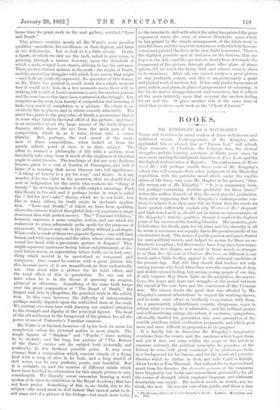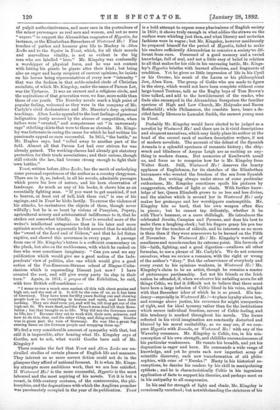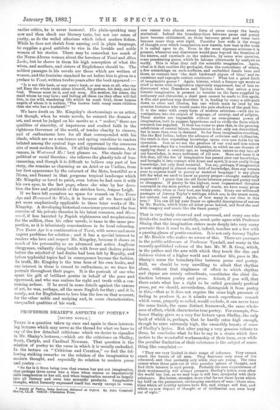BOOKS.
MR. KINGSLEY AS A NOVELIST.*
THERE will doubtless be many readers of these well-known and well-loved novels. Contemporaries of Mr. Kingsley, who applauded him or abused him as " Parson Lot," will refresh their memories of Chartism, the Crimean war, the clerical struggles, and the burning questions of thirty years since, by once more reading the indignant diatribes of Alton Locke and the theological controversies of Bypath'. The enthusiasm of West- ward Ho ! will perhaps startle those even of Mr. Kingsley's, school who will compare their sober judgment of the Black-Sea. expedition, with the patriotic novel which, under the warlike stress of the time, was, says Mr. Hughes in his preface, " liter- ally wrong out of Mr. Kingsley." "It is a sanguinary book, but perhaps containing doctrine profitable for these times," writes the author himself, of this, his most popular production. Now, even supposing that Mr. Kingsley's contemporaries con- tinue to admire it as they once did, we think that the words we have quoted sufficiently explain why Westward Ho ! eloquent and high-toned as-it is, should not be taken as representative of Mr. Kingsley's artistic qualities, though it marked the highest point of his success at the lending libraries. His memoirs, pub- lished. since his death, gain for his aims and his sincerity in all he wrote a reverence not equally due to the positive merits of his constructive work. The waves of public passion and panic floated his semi-political novels, and helped to assure for them an en- thusiastic reception ; but those waves have long since been trans- formed into new shapes, and much in these novels is stranger to us than Don Quizote or Clarissa Harlowe, so different is our mood, and so little do they appeal to the personal emotions of the present day. But still they should find readers not only among persons who lived when they were the expression of deep and widely-spread feeling, but among young people of our day, if only because they throw light on the prejudices, the aspira- tions, the hopes and fears and struggles of the period between the repeal of the corn laws and the conclusion of the Crimean war. We cannot doubt the good that was effected by Mr. Kingsley's earnest exhortations to respect the working-classes, and to make some effort at brotherly co-operation with them. As a passionately philanthropic country clergyman, eager to reform what is wrong, he is admirable ; and his brilliant genius and self-sacrificing energy, his ardent, if exclusive, sympathies, effectually startled his generation into some perception of the terrible problems which civilisation propounds, and which grow more and more difficult in proportion to its progress.
It is hardly fair to dissociate Mr. Kingsley's imaginative creations from the events and the emotions which begot them, and yet it does not come within the scope of this article to
examine seriously the political principles he preaches, or the history he uses, with great command of its picturesque facts, as a background for his fancies, and for the moral and patriotic theories which he clothes in flesh, and calls Cyril or Ralegh, Alton Locke or Tom Thurnall. But without the background and apart from his theories, the dramatis persona: of his romances have frequently but feeble and intermittent personality, for all the excess of strength which emphatic language and elaborate description can supply. His earliest novels, as novels, are, we think, the best. He was not sure of his public, and there is less • The Eeereley Edition of Charles Kingeley's Nord& London : Macmillan and Co. Issi.
of pulpit authoritativeness, and more care in the portraiture of the minor personages as real men and women, and not as mere " supers " to support the Alexandrian magnates of Hypatia, for instance, or the Elizabethan Berserkers of Westward Ho! Fine touches of pathos and humour give life to Mackay in Alton Locke and to the Squire in Yeast, which, for all their muscle and marvellous vitality, is not so evident in the big men who are labelled "hero." Mr. Kingsley was confessedly a worshipper of physical force, and he was not content with letting his giants be giants after their kind ; but being also an eager and hasty recipient of current opinions, he insists on his heroes being representatives of every new " intensity " that was the fashion in that noble-minded circle of Christian socialists, of which Mr. Kingsley, under the name of Parson Lot, was the Tyrtaeus. It was an earnest and a religious circle, and the aspirations of that generation were, we fear, more noble than those of our youth. The Eversley novels mark a high point of popular feeling, welcomed as they were in the company of Mr. Carlyle's vivid declamations and Mr. Maurice's deep spiritual teachings. Alton Locke appealed to the best feelings of generous indignation justly aroused by the abuses of competition, when tailors were "sweated," and sempstresses sat "in unwomanly rags" stitching shirts that were to them as shrouds. Mr. Kings- ley was fortunate in seeing the cause for which he had written his passionate appeal so soon successful. In 1855, "the battle," as Mr. Hughes says, had "rolled away to another part of the field. Almost all that Parson Lot had ever striven for was already gained. The working-classes had already got statutory protection for their trade associations; and their unions, though still outside the law, had become strong enough to fight their 'own battles."
Yeast, written before Alton Locke, has the merit of embodying some personal experiences of the author as a country clergyman. There are in it, as, indeed, in all his novels, admirable passages which prove his love of nature, and his keen observation of landscape. As much as any of his books, it shows him as an essentially fighting man. "If you want to get mankind, if not to heaven, at least out of hell, kick them out," is one of his sayings, and in Yeast he kicks lustily. To excuse the violence of his attacks, he caricatures the objects of them, though never wilfully ; but he is so beset by visions of Puseyism, Popery, agricultural misery and aristocratical indifference to it, that he strikes out somewhat blindly. In Yeast is revealed more of the writer's intellectual antagonisms than in his later and more optimist novels, when apparently he felt assured that he wielded the "sword of the Lord and of Gideon," and that he led Satan captive, and showed this assurance in every page. A passage from one of Mr. Kingsley's letters is a sufficient commentary on the pluck, but also on the recklessness, with which he rushed on foes who were sometimes imaginary. "Can you send me any publication which would give me a good notion of the Inde- pendents' view of politics, also one which would give a good
notion of the Fox-Emerson-Strauss school of Blagne-Unita- rianism which is superseding Dissent just now ? I have counted the cost, and will give every party its slap in their turn." Again, in 1851, a propos of the Exhibition, he said, with true British self-confidence :— "I mean to run a muck soon against all this talk about genius and high art, and the rest of it. It will be the ruin of us, as it has been of Germany. They have been for fifty years finding out and showing people how to do everything in heaven and earth, and have done nothing. They are dead even yet, and will be, till they get out of the high-nit fit. We were dead, and the French were dead till their Revo- lution; but that brought us to life. Why did not the Germans come to life, too ? Because they set to work with their arts, sciences, and how to do this, that, and the other thing, and doing nothing. Goethe was in great part the ruin of Germany. He was like a great fog coming down on the German people and wrapping them up."
We feel a very considerable amount of sympathy with that, but still it is impossible, after hearing what Mr. Kingsley says of Goethe, not to ask, what would Goethe have said of Mr. Kingsley ?
There remains the fact that Yeast and Alton. Locke are un- rivalled studies of certain phases of English life and manners.
They interest us as more correct fiction could not do in the glimpses they afford of national ferment. It is when Mr. Kings- ley attempts more ambitions work, that we are less satisfied.
If Westward Ho! is the more successful, Hypatia is the most laboured and the most aspiring of his novels. Yet it is but a recast, in fifth-century costume, of the controversies, the phi- losophies, and the dogmatisms with which the Anglican preacher was passionately occupied in the year of its publication. Yeast is a bold attempt to expose some pharisaisms of English society in 1850; it shows truly enough in what eddies the straws on the surface were whirling just then, and what literary and sectarian fashions were in vogue ; but Mr. Kingsley, however assiduously he prepared himself for the period of Hypalia, failed to make his readers sufficiently Alexandrian to conceive a society's° dif- ferent from ours. Possessed of a good memory and a varied knowledge, full of zeal, and not a little easy of belief in relation to all that makes for his side in his unceasing battle, Mr. Kings- ley's Hypatia bristles with learned allusions, and fragments of erudition. Yet he gives us little impression of life in his Cyril or his Orestes, his monk of the Laura or his philosophical Jew, Aben Ezra. The group of Goths who are made to figure in the story, which would not have been complete without some large-boned Teutons, talk as the Rugby boys of Tom Brown's time talked, and add to the bewilderment of the reader, who finds also encamped in the Alexandrian Serapeinm the familiar spectres of High and Low Church, Mr. Holyoake and Baron Rothschild ; while Philammon, the cenobite hero, bears a de- cided family likeness to Lancelot Smith, the earnest young man in Yeast.
Probably Mr. Kingsley would have elected to be judged as a novelist by Westward Ho! and there are in it vivid descriptions and eloquent narratives, which may fairly place its author at the head of the second rank of modern descriptive writers, if not of modern novelists. The account of the defeat of the Spanish Armada is a splendid specimen of romantic history ; the ship- wreck and blindness of Amyas Leigh are as exciting as any- thing in modern drama. But memories of Kenilworth assail us, and force us to recognise how far is Mr. Kingsley from Walter Scott. Still, Westward Ho! deserves the hearty applause of Englishmen, for its sketches of the Elizabethan buccaneers who wrested the freedom of the sea from Spanish hands. But writing always under stress of some particular enthusiasm, Mr. Kingsley sometimes spoils his pictures by exaggeration, whether of light or shade. With further know- ledge of her, Queen Elizabeth grows to us less and less divine, and the nimbus which is around her in Westward Ho! only makes her grotesque and her worshippers contemptible. Mr. Kingsley hits so hard, that his own weapon often flies in pieces; but he cannot tap delicately, whether it be with Thor's hammer, or a mere shillelagh. He introduces the celebrated Jesuits, Campian and Parsons, and does his best to make them a laughing-stock ; but his fingers grasp his pen too fiercely for fine touches of ridicule, and he interests us no more in them than if they were scarecrows to be burned on the Fifth of November. In Westward Ho! Mr. Kingsley's worship of manliness and muscle reaches its extreme point. His formula of life—faith, fighting, and a good digestion—swallows all other formulas, to use a phrase of Mr. Carlyle's. We do not concern ourselves, when we review a romance, with the right or wrong of the author's "dozy." But the subservience of everybody and every event to his opinions weakens, in Westward Ho! Mr. Kingsley's claim to be an artist, though he remains a master of picturesque partisanship. Let not his friends or the Irish nation be offended, if, when we observe his unfailing scorn for all things Celtic, we find it difficult not to believe that there must have been a large infusion of Celtic blood in his veins, mingled with that Berserker ichor of which he is so proud. His ten- dency—especially in Westward Ho !—to place loyalty above law, and courage above justice, his reverence for might irrespective of right, and for ideal tyranny rather than for the institutions which secure individual freedom, savour of Celtic feeling, and this tendency is marked throughout his novels. The forms reflected in his vivid imagination are constantly disturbed and blurred by his moral excitability, as we may see, if we com- pare Hypatia with Romola, or Westward Ho! with any of the Waverley romances. Mr. Kingsley is Celtic, too, in his mis- conception of his own strength, and childlike unconsciousness of his particular weaknesses. He vaunts his breadth, and yet his dogmatism is eager and keen. He commands a wide range of knowledge, and yet he greets each new imperfect scrap of scientific discovery, each new transformation of old philo- sophies, with cries of "Eureka!" Hasty in his historical as- sumptions, he dazzles his readers by his skill in manipulating epithets ; and he is characteristically Celtic in his ingenious application of facts to support his theories, and perhaps most so in his antipathy to all compromise.
In his zeal for strength of light and shade, Mr. Kingsley is occasionally unrefined; but notwithstanding the strictures of his earlier critics, he is never immoral. His plain-speaking may now and then shock our literary taste, but not our sense of purity, as do the veiled allusions which infest modern fiction. While he does not shrink from naming evil in plain language, he supplies a good antidote to vice in the lovable and noble women of his stories. There may be somewhat too much of the Norse-Alruna woman about the heroines of Yeast and Alton Locke, but he shows in them his high conception of what the wives, and mothers, and sisters of Englishmen should be. The noblest passages in his novels are those which are written of women, and the feminine standard he set before him is given in a preface to Yeast, written twelve years after the book appeared :—
"It is not this book, or any man's book, or any man at all, who can tell Esau the whole truth about himself, his powers, his duty, and his God. Woman must do it, and not man. His mother, his sister, the maid whom he may love ; and failing all these (as they often will fail him, in the wild, wandering life which he must live), those human angels of whom it is written, The barren hath many more children than she who has a husband.'"
We have dwelt on Mr. Kingsley's shortcomings as an artist, but though, when he wrote novels, he entered the domain of art, and must be judged on his merits as a "maker," there are qualities of sincerity, of impetuous and exalted faith in the righteous Governor of the world, of tender charity to sinners, and of enthusiastic love for all that corresponded with his ideals, which are as a sea-breeze and spring sunshine to readers belated among the cynical fogs and oppressed by the sensuous airs of most modern fiction. Of all his feminine creations, Aya- canora, in Westward Ho! best pleases us. She stands free of political or social theories ; she relieves the ghastly tale of buc- caneering, and though it is difficult to believe any part of her story, she remains as charming as an Ariel or an Undine, from her first appearance by the cataract of the Meta, beautiful as a Diana, and framed in that gorgeous tropical landscape which Mr. Kingsley so loved to paint, even before he had seen it with his own eyes, to the last page, where she wins by her devo- tion the love and gratitude of the stricken hero, Amyas Leigh. If we have left ourselves no space for remark on Two Years
Ago and Hereward the Wake, it is because all we have said is yet more emphatically applicable to these later works of Mr. Kingsley. A developing historical conscience prevented the free exercise of his private theories in his latest romance, and Here- ward, if less haunted by Popish nightmares and neoplatonism
for the million, than his other novels, is tame in the same pro- portion, as it is laboriously conscientious in its local colouring.
Two Years Ago is a continuation of Yeast, with newer and more urgent problems for solution ; and it has a special interest to readers who love and respect Mr. Kingsley, because it shows so much of his personality as an advanced and active Anglican clergyman, valiantly doing battle with fever and cholera poison before the mischief of bad drains had been felt by Royalty, and before typhoidal topics had in consequence become the fashion. In truth, Mr. Kingsley is the true hero of his own books, and our interest in them is roused to enthusiasm, as we trace his portrait throughout their pages. It is the portrait of one who spent his gift of brilliant genius in behalf of the poor and oppressed, and who was zealous for right and truth with a con- suming ardour. If he erred in some details against the canons of art, he was, perhaps, all the more English for that ; and it is, surely, not for Englishmen to love him the less on that account, for the other noble and undying and, in some characteristics, unequalled qualities of his work.








































 Previous page
Previous page